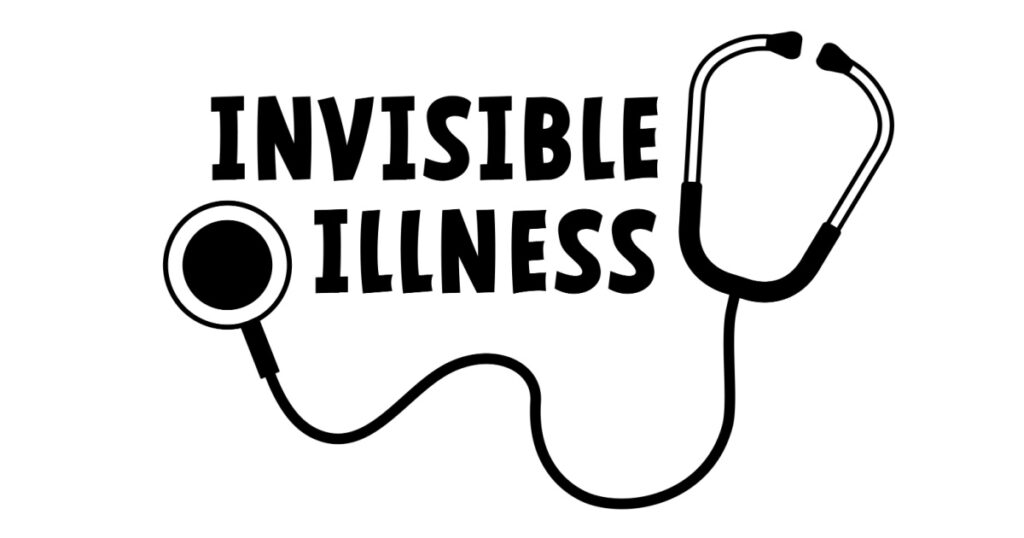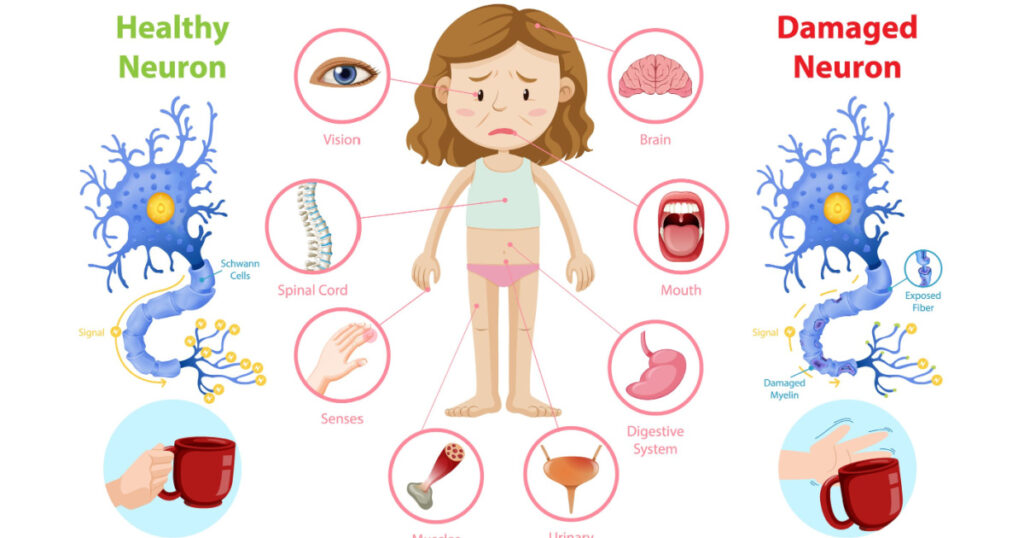Living with multiple sclerosis (MS) can be a challenging and life-altering experience. This chronic autoimmune disease affects the central nervous system, leading to a wide range of symptoms such as fatigue, pain, cognitive impairment, and mobility issues. Although each individual’s experience with MS is unique, there are certain aspects of the disease that only those who have it truly understand.
What Is MS?

Multiple sclerosis (MS) is a chronic autoimmune disease that affects the central nervous system (CNS). It occurs when the immune system mistakenly attacks myelin, which is a protective coating around nerve fibers in the brain and spinal cord. This causes inflammation and damage to these areas, leading to a wide range of symptoms such as fatigue, pain, cognitive impairment, and mobility issues.
Read: 11 Diseases That May Start With Your Gut Bacteria
Understanding MS

Friends and family members of people with MS do their best to sympathize with how this person is feeling. While this usually comes with the best intentions, the reality is that it will be impossible for them to understand what living with this condition is like. That being said, these are some of the things that people with MS want others to know about living with this illness. (1, 2)
1. The Unpredictability of MS

One of the most frustrating aspects of living with MS is the unpredictability of symptoms. Each day can bring new challenges or unexpected improvements, making it difficult to plan and manage daily activities. When they bail on plans, it’s not because they don’t value your relationship, it’s because their bodies truly won’t let them.
2. The Fatigue Battle

Fatigue is a common symptom of MS, but it is not simply feeling tired. MS-related fatigue is often overwhelming and persistent and can impact all aspects of life. This is often the number one reason why your friend with MS often bails on plans the day of. The heavy fatigue consuming their body simply won’t let them.
3. The Invisible Symptoms

MS can manifest with invisible symptoms that are not immediately apparent to others, such as pain, cognitive fog, or sensory issues. Navigating through these hidden challenges can be isolating. Often, when people with MS are struggling with invisible symptoms such as chronic pain or extreme fatigue, they will look fine to the outside world. People will tell them they are looking good, thinking that they are contributing something positive. In reality, it makes people with MS feel even more unseen or invisible.
Read: Heart Disease: 10 Warning Signs that Appear On Your Skin
4. The Emotional Roller Coaster

Dealing with a chronic illness like MS can take a toll on one’s emotional well-being. The constant uncertainty and lifestyle adjustments can lead to a wide range of emotions, from frustration and sadness to gratitude and resilience. Some days, their capacity to manage these emotions is just bottomed out to zero.
5. The Relentless Heat Sensitivity

Many individuals with MS find that heat exacerbates their symptoms. Even small increases in temperature can cause fatigue, weakness, and other unpleasant sensations.
6. The Chronic Pain

Chronic pain can make just getting through the day a challenge. MS-related pain can vary in intensity and location and is often described as burning, sharp, or tingling. Managing and finding relief from chronic pain becomes a constant consideration.
Read: How Might Ginger Help with Obesity and Fatty Liver Disease?
7. The Cognitive Challenges

Cognitive impairment, including difficulties with memory, concentration, and problem-solving, affects many individuals with MS. Accommodating these challenges and finding effective coping strategies often becomes crucial. The struggle lies where people do not know how to accommodate them or don’t understand enough to feel like they should have to.
8. The Importance of Exercise

Engaging in regular exercise is vital for managing MS symptoms and maintaining overall health. However, finding the right exercise routine that balances benefits and fatigue can be a trial-and-error process. This makes sticking to a routine (a class, a personal trainer, or another fitness plan) very difficult.
9. The Limitations on Mobility

MS can significantly impact a person’s mobility, ranging from mild difficulties to requiring assistive devices or mobility aids. Living in a society designed for those without mobility issues heightens the awareness of these limitations.
Read: 20 Symptoms of Lyme Disease You Can’t Afford to Ignore
10. The Daily Medication Routine

The management of MS often involves taking various medications, each with specific instructions and potential side effects. Adhering to a medication regimen becomes part of daily life. This makes going out of your routine and traveling much more complicated.
11. The Constant Monitoring of Symptoms

MS requires constant vigilance and self-monitoring of symptoms. Recognizing changes in symptom patterns and knowing when to seek medical assistance becomes crucial for managing the disease effectively.
12. The Financial Burden

The treatments, medications, and support services needed to manage MS can be costly. Additionally, the potential impact on employment and income poses additional financial stressors, further complicating the management of the disease.
Read: Memories Of Music Cannot Be Lost During Various Stages Of Alzheimer’s Disease
13. The Importance of Support Systems

Building a strong support system, including family, friends, healthcare professionals, and support groups, becomes essential for emotional support. Learning from others’ experiences and finding encouragement during difficult times is crucial. It is key to have people around them who understand the illness and walk beside them on their journey.
14. The Ever-Present Fear of Relapses

MS is characterized by relapses or exacerbations, which are unpredictable flare-ups of symptoms. These periods of increased disease activity can be emotionally draining and raise concerns about long-term disability. They will also prevent people from participating in their regular lives. This could mean missing school or work, being unable to care for pets or children, and missing out on social opportunities with friends and family.
15. The Daily Battle for Independence

Many individuals with MS are determined to maintain their independence and accomplish daily tasks on their own. However, the fluctuations in symptoms make this an ongoing challenge that requires adaptability and resilience.
Read: Experts Say You Should Add This To Your Coffee Every Day To Keep Your Heart Healthy And Prevent Disease
16. The Importance of Self-Care

Practicing self-care becomes paramount in managing MS. This includes not only physical care but also prioritizing mental and emotional well-being.
17. The Adjustments to Lifestyle and Expectations

MS often requires significant adjustments to one’s lifestyle, including changes in career goals, relationships, parenting, and recreational activities. Accepting and adapting to these new realities can be both empowering and challenging.
18. The Need for Advocacy

Navigating the healthcare system, accessing appropriate care, and ensuring understanding and support from others often require individuals with MS to become their own advocates.
Read: 12 Million are Unaware They Have Thyroid Disease. Do You Know The Signs?
19. The Impact on Relationships

MS can significantly impact relationships, strain friendships, romantic partnerships, and familial bonds. Open communication, empathy, and compassion are crucial for maintaining healthy connections.
20. The Importance of a Healthy Diet

A healthy diet can play a role in managing MS symptoms and overall well-being. Many individuals with MS find that certain dietary choices, such as reducing inflammatory foods or increasing nutrient-dense options, can positively impact their condition. While this is easy to do at home, it can make eating out and social situations more complicated. This can be isolating and anxiety-inducing.
21. The Constant Adaptation

Living with MS means constantly adapting to the unpredictable nature of the disease. This includes exploring new coping mechanisms, adjusting goals and expectations, and finding new ways to navigate daily life.
22. The Importance of Mental Health Support

MS can take a toll on mental health, leading to increased rates of depression, anxiety, and stress. Seeking professional mental healthcare support can be crucial for maintaining emotional well-being.
Read: Study Links Mono Virus to Several Serious Diseases
23. The Life-Work Balance Struggle

Balancing work, family, and personal life is difficult for everyone. This becomes even more complicated when managing the demands of MS. Learning to prioritize and set boundaries becomes essential for finding a satisfying balance.
24. The Unexpected Moments of Resilience

Despite the challenges posed by MS, individuals often find unexpected moments of resilience and strength that emerge from living with this chronic condition.
25. The Hope for a Cure

Finally, only someone with MS understands the deep desire for a cure and the unwavering hope that medical advancements will continue to improve the lives of those affected by the disease.
How To Be A Friend to Someone With MS

Being a friend to someone with multiple sclerosis involves understanding and empathy. Educate yourself about the condition so you can provide support and be aware of potential challenges. Offer practical help when needed, and be flexible and patient as their symptoms may vary. Most importantly, be a good listener and express genuine care to let your friends know they’re not alone in their journey with multiple sclerosis.
Read: Study: Endometriosis Sufferers More Likely to Develop Heart Disease
Here are some tips for being a good friend to someone with MS (3)

- Be Patient: MS is a chronic condition that affects people differently. Some days will be better than others, and your friend may need time to adjust to their new normal. Try not to get frustrated if they cancel plans or seem distant at times; instead, offer support and understanding when they need it most.
- Be Understanding: MS can cause a wide range of symptoms, including fatigue, pain, and cognitive issues. Your friend may not always be able to do the things they used to do, so try to be understanding when this happens. Offer support and help out when you can, but don’t push them into doing things that are uncomfortable or difficult for them.
- Be a Good Listener: MS can be a very isolating disease, so it’s important to be there for your friends when they need someone to talk to. Listen without judgment and offer support when needed. If you don’t know what to say, just let them know that you care about them and are there for them.
- Don’t Be Afraid to Ask Questions: If you don’t understand something about MS, ask your friend to explain it to you. They may not know all the answers, but they can help you better understand their condition and how it affects them.
- Be an ally: If you see your friend struggling with something, offer to help them out. This could be as simple as running errands or cooking dinner for them when they’re feeling too tired to do it themselves. If they need assistance with something more serious, like finding a new doctor or getting insurance coverage for their medications, offer to help them research options and make phone calls.
The Bottom Line

Living with MS presents a unique set of challenges that can only be truly understood by those who experience it firsthand. From the unpredictable symptoms to the emotional roller coaster, individuals with MS navigate a complex landscape of physical, mental, and emotional hurdles. However, amidst the struggles, there is also a powerful sense of resilience, hope, and empowerment. By raising awareness about these 25 things that only someone with MS would know, we can foster empathy and understanding, supporting those living with MS in their journey towards better manageability and improved quality of life.
Keep Reading: 7 Warning Signs of Hand-Foot-and-Mouth Disease Parents Need to Look Out For
Sources
- “Truths About Multiple Sclerosis That Nobody Likes To Talk About.” MYM Steam. Brittany Quiroz.
- “What People Who Have MS Wish You Knew.” WebMD. Shishira Sreenivas
- “How to Be a Friend to a Person With MS.” Everyday Health. Madeline R. Vann, MPH and Christina Vogt.

